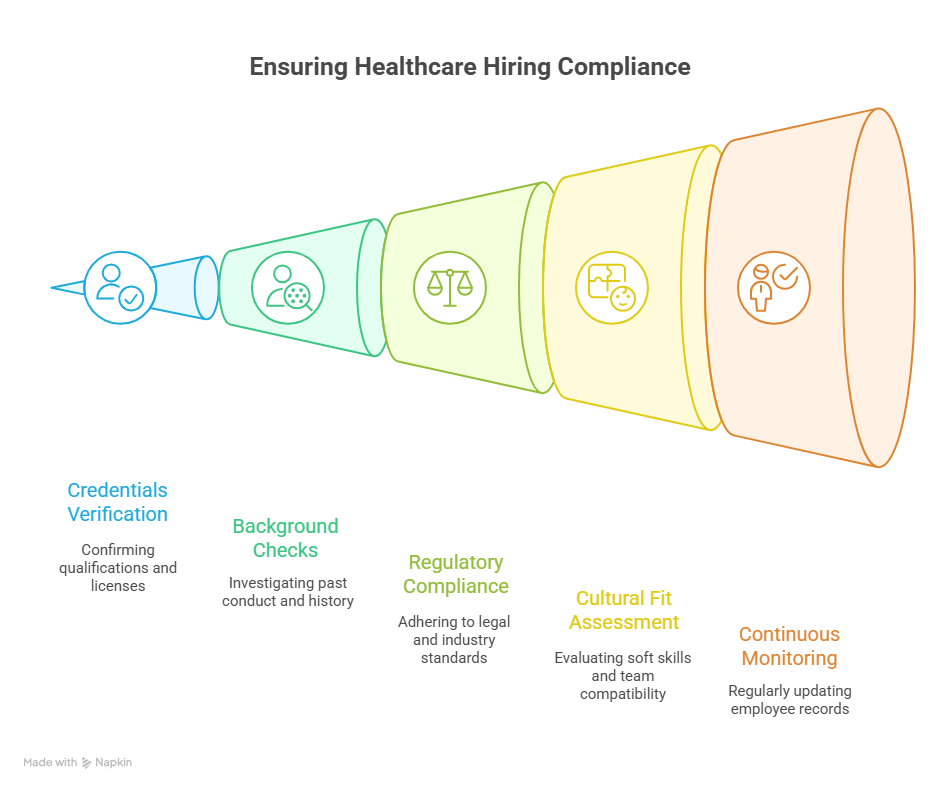In the fast-paced world of healthcare, hiring the right talent is crucial. Hospitals need to ensure that they sidestep common screening pitfalls to maintain quality care and compliance. From healthcare screening mistakes to common hospital background check errors, knowing these potential traps can save time, resources, and even lives.
Key Takeaways
- Always verify healthcare professionals' credentials independently to ensure patient safety and legal compliance.
- Conduct comprehensive background checks to avoid hiring individuals with problematic histories that could pose risks.
- Stay compliant with healthcare hiring regulations by keeping updated on laws such as the Fair Credit Reporting Act (FCRA).
- Prioritize cultural fit and soft skills like empathy and communication during hiring to enhance patient care and team dynamics.
- Implement continuous monitoring of employees to quickly address any emerging issues that could affect hospital operations.
Pitfall #1: Overlooking Thorough Credentials Verification
Making sure healthcare professionals have the right qualifications is more than just a formality—it's about patient safety and legal compliance. The Professional Background Screening Association highlights the need for a meticulous approach to verifying credentials. Yet many hospitals make the mistake of accepting claims at face value. This can include overlooking discrepancies in educational records or not noticing expired licenses.
Consider the case of a hospital that hired a nurse based on an unverified degree. When an issue arose, it was discovered she attended a non-accredited school. This avoidable error not only risked patient care but also led to legal complications and damaged the hospital's reputation.
To prevent such scenarios, verify every credential independently. Don't rely on the applicant's word or the university's word alone. Establish a system for continuous education checks to ensure ongoing compliance with licensure requirements. Regularly updating these checks is crucial, especially with the fast-evolving standards in healthcare. You wouldn't want your hospital at risk over an overlooked detail, would you?

Pitfall #2: Inadequate Background Checks
Incomplete background checks can lead to negligent hiring, which carries significant legal and financial risks for hospitals. Missing or ignoring pieces of a candidate's past could result in hiring individuals with histories of misconduct, endangering patients and staff alike. The potential for lawsuits and reputational damage should not be underestimated.
Common errors include overlooking misdemeanor offenses, which might hint at problematic behavior, and using outdated screening policies that no longer meet industry standards. Another frequent mistake is failing to cross-reference multiple sources of information, leading to inaccurate assessments of a candidate's suitability.
To avoid these pitfalls, hospitals should adopt comprehensive screening processes. Employing third-party services specialized in healthcare screening can streamline checks and bring in additional expertise. Regularly updating screening protocols ensures they're aligned with the latest legal requirements and best practices.
It's crucial to remember that maintaining strict screening standards isn't solely about compliance; it's also about creating a safer environment for everyone. Are your current procedures enough to protect your institution's integrity and the well-being of those in your care?
Pitfall #3: Non-Compliance with Healthcare Hiring Regulations
Navigating the complex landscape of healthcare hiring regulations can be challenging, but compliance is non-negotiable. Key regulations like the Fair Credit Reporting Act (FCRA) set the standard for how background checks should be handled. Ignoring these can lead to substantial legal penalties and jeopardize your hospital's reputation.
Misinterpretations of the FCRA in the healthcare hiring context are common. For example, failing to obtain proper consent before conducting a background check or not providing candidates with appropriate disclosures can result in hefty fines. Similarly, overlooking state-specific laws that may impose additional requirements on background checks can create compliance gaps.
Keeping your hospital compliant requires constant attention and effort. Regular compliance training for HR staff can mitigate the risk of missteps. These sessions should cover the latest updates and nuances in hiring laws. Moreover, adapting hiring policies to align with current regulations ensures that your procedures are up-to-date and legally sound.
Consistently reviewing these policies and seeking legal counsel when necessary helps prevent costly mistakes. Doing so not only protects your hospital from legal action but also ensures a secure and trustworthy environment for your patients and staff.
Pitfall #4: Insufficient Focus on Cultural Fit and Soft Skills
Soft skills are not a bonus in healthcare—they're essential. Empathy, teamwork, and communication aren't just nice to have; they can directly affect patient outcomes and team dynamics. Yet, these skills often get sidelined during hiring.
When hospitals ignore cultural fit and soft skills, they risk disruptions in team harmony and patient care. Imagine having a technically skilled nurse who lacks empathy. That gap can lead to patient dissatisfaction or even mishandled situations.
To avoid this, consider integrating behavioral interviews into your hiring process. Ask candidates about past experiences where they resolved conflicts or showed compassion under stress. Scenario-based assessments can also help. These simulate real situations, giving a glimpse of how candidates might behave when faced with tough choices.
Pay attention to how candidates interact with current staff during interviews. This alone can indicate whether they harmonize with your existing team culture. Remember, hiring someone who fits well can improve team morale and productivity.
Are you giving enough weight to these crucial soft skills when hiring for your hospital? If not, it might be time to adjust your approach and put these often-undervalued skills in the spotlight.
Pitfall #5: Ignoring Continuous Monitoring
Regularly monitoring employees after they're hired is crucial. Continuous screening helps detect new issues that might emerge over time. While initial background checks are important, they only provide a snapshot of a candidate's past.
In hospitals, where errors can have grave consequences, not updating employee background data can be risky. Someone with a clean record at hiring might later face charges or disciplinary actions. These developments could impact their role or the hospital's liability. Ignoring such changes can undermine trust in your healthcare team.
Implementing a robust re-screening process is vital, especially for positions with high patient interaction or sensitive access. Schedule periodic reviews of employee records. Many services provide automated alerts when an employee's status changes, ensuring prompt action.
Consider focusing extra attention on high-risk roles, such as those handling narcotics or financial transactions. Establish clear protocols: how often checks occur, what triggers a re-evaluation, and what actions to take with flagged reports. This strategy not only protects your hospital but also promotes a safer environment for patients and staff.

Conclusion
Avoiding screening pitfalls in healthcare hiring is not just about following a checklist. It's about recognizing the direct impact these decisions have on patient care and safety. Ensure that your HR processes are not riddled with errors and omissions. Intentionally cultivate a culture where thorough background checks, regulatory compliance, and continuous employee vetting are the norms, not exceptions.
Maintaining comprehensive screening practices relies heavily on proactive measures and dedication to ongoing education for HR teams. The landscape of healthcare regulations constantly evolves. Staying informed and adapting processes is crucial. Revisit your screening protocols regularly to align with current standards and legal requirements.
By investing in robust hiring practices and regular training, you strengthen the foundation of your healthcare institution. Encourage your teams to prioritize these practices for the future health of your organization and its patients. Remember, the path to excellence in healthcare starts with who you bring onboard. Stay vigilant and committed to transparency and thoroughness in all hiring endeavors.
Frequently Asked Questions (FAQs)
What background checks are required for hospital staff?
Hospitals conduct a variety of background checks to ensure patient safety and compliance with regulations. These checks often include criminal history, employment verification, education verification, drug testing, and credential verification for licensed professionals. It’s crucial not only to verify qualifications but also to spot any potential issues like past criminal activity.
How do hospitals stay compliant with healthcare screening laws?
Hospitals stay compliant by adhering to federal and state regulations related to employee screenings. They often work with legal and HR professionals to stay up-to-date with laws like the Fair Credit Reporting Act (FCRA) and other healthcare-specific requirements. Implementing consistent background check procedures is essential to avoiding legal pitfalls.
Why is continuous monitoring important for healthcare employees?
Continuous monitoring helps hospitals quickly identify any changes in an employee's background that might affect their ability to perform their role safely. For instance, if a healthcare worker is charged with a crime after being hired, the hospital can take appropriate action to protect patients and staff. This ongoing vigilance is crucial in maintaining a safe environment for everyone.
What are OIG and SAM exclusions, and how are they checked?
OIG (Office of Inspector General) and SAM (System for Award Management) exclusions identify individuals and entities prohibited from participating in federal healthcare programs. Hospitals check these databases regularly to ensure they don't hire or retain excluded individuals. This process helps avoid penalties and maintain program integrity.
Can a hospital be fined for hiring someone with a criminal record?
Hospitals can face penalties for not adhering to background check and exclusion list requirements. While having a criminal record doesn't automatically disqualify someone from healthcare employment, failing to conduct appropriate checks or mistakenly employing individuals on exclusion lists can lead to fines and loss of funding.
How often should hospital staff background checks be updated?
Regular reviews depend on hospital policies and legal requirements. Some check every two years, while others have annual reviews. This practice ensures that any significant changes in an employee's background are identified in a timely fashion.
What should a hospital do if an employee is found on exclusion lists?
If an employee appears on an exclusion list, the hospital should promptly suspend the individual from duties involving federal healthcare programs. Immediate consultation with legal counsel is advised to determine the appropriate course of action and report to relevant authorities, if required.
How can hospitals minimize the risk of hiring someone with falsified credentials?
Hospitals can minimize this risk by implementing thorough credential verification processes, including contacting certifying bodies and reviewing primary source documentation directly. Maintaining a stringent verification process helps ensure all credentials are legitimate.
What are the risks involved with improper healthcare employee screening?
Improper screening can result in hiring individuals who may pose safety risks to patients and staff or who are legally barred from healthcare work. This can lead to financial penalties, legal action, and damage to reputation.
How do hospitals find reliable background check services?
Hospitals should seek services that specialize in healthcare background checks and are compliant with industry regulations. Research, references, and reviews are vital steps in finding a reliable provider that conducts thorough, accurate screenings.
Definitions
Before embarking on the implementation phase, it is necessary to understand the key terms which form the basis of secure and compliant recruitment practice in healthcare. Such terms must not be viewed as jargon; instead, they form the pillars of ethical human resource management for clinical environments. Either to enhance existing processes or to implement them for the first time, the following definitions will explain the concepts of accountability, safety, and trust.
Credentials Verification
The process of confirming that a job candidate’s education, licenses, and certifications are valid, current, and earned from recognized institutions. In healthcare, this step safeguards patients by ensuring professionals meet clinical and legal standards. Always cross-check credentials with licensing boards and accreditation bodies rather than taking documents at face value.
Background Checks
A structured review of a candidate’s criminal history, employment record, education, and other relevant information. For healthcare roles, complete checks help avoid hiring someone with a history of misconduct or fraud. To strengthen your process, confirm reports through multiple sources and update your procedures regularly as laws change.
Hiring Regulation Compliance
Adhering to federal, state, and industry-specific rules during the recruitment process. This includes laws like the Fair Credit Reporting Act (FCRA), which governs how you conduct background checks and informs applicants. Staying compliant means obtaining proper consent, giving disclosures, and regularly reviewing your policies to reflect any legal changes.
Cultural Fit and Soft Skills
The alignment between a candidate’s personality, values, and interpersonal abilities with your team's work style and environment. Traits like empathy, communication, and teamwork are critical in healthcare settings. Evaluate these qualities through behavioral interview questions, real-life scenarios, and observing how candidates interact with current team members.
Continuous Monitoring
An ongoing process that checks employee records after hiring for any updates—such as criminal charges, license suspensions, or disciplinary actions. This helps you act promptly when risks arise. Implement check-in intervals, use automated alerts, and define steps for when issues are flagged, especially in high-risk roles.
References
Still have questions?
Get in touch with our team today for a personalized demo and discover how our tailored volume pricing and packages can drive results for your business!
How useful was this page?*
Note: your comments are anonymous. We use them to improve the website. Do not include any personal details.
Visit our FCRA Compliance Tool or leave a message here if you need a response.
From the blog Explore the GCheck Content Hub

Navigating the New York Education Background Check Process: A 2026 Operational Guide
28 Jan, 2026 • 18 min read
Florida Education Background Checks: 2026 Compliance Guide for School Districts
27 Jan, 2026 • 20 min read
Texas Construction Background Check Requirements: Compliance and Best Practices for 2026
27 Jan, 2026 • 19 min readThe information provided in this article is for general informational and educational purposes only and should not be construed as legal advice or a substitute for consultation with qualified legal counsel. While we strive to ensure accuracy, employment screening laws and regulations—including but not limited to the Fair Credit Reporting Act (FCRA), Equal Employment Opportunity Commission (EEOC) guidelines, state and local ban-the-box laws, industry-specific requirements, and other applicable federal, state, and local statutes—are subject to frequent changes, varying interpretations, and jurisdiction-specific applications that may affect their implementation in your organization. Employers and screening decision-makers are solely responsible for ensuring their background check policies, procedures, and practices comply with all applicable laws and regulations relevant to their specific industry, location, and circumstances. We strongly recommend consulting with qualified employment law attorneys and compliance professionals before making hiring, tenant screening, or other decisions based on background check information.


